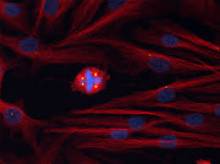Researchers probe cell division defects to gain insight into cancer
 Posted date: 10 Jul 2019
Posted date: 10 Jul 2019
From bugs to plants to animals, for all living things to grow they must create more cells. To do so, each existing cell, whether in an embryo or an adult, receives cues to copy its chromosomes — large pieces of DNA that contain each cell’s entire genetic code. In a carefully and elegantly controlled process, each cell then divides into two.
However, this process can also go awry. If chromosomes are not correctly distributed to the two “daughter” cells, the new cells may die or grow uncontrollably, a hallmark of cancer. In fact, up to 90 percent of solid tumours are marked by a condition known as aneuploidy, where cells contain an incorrect number of chromosomes.
“It’s really important to understand the basic mechanisms of how chromosomes segregate in normal cells, and then looks at whether those mechanisms are different in cancers,” says researcher Mark Burkard. COURTESY OF UW CARBONE CANCER CENTER
“We don’t really understand how chromosome mis-segregation happens in cancer,” says Mark Burkard, a medical oncologist and researcher with the University of Wisconsin–Madison Carbone Cancer Centre. “One of the big disappointments, and opportunities, is that we know all these other genes that are mutated in cancers, but no one have really found the smoking gun for how chromosome segregation goes wrong.”
Posted By

GSP Admin




